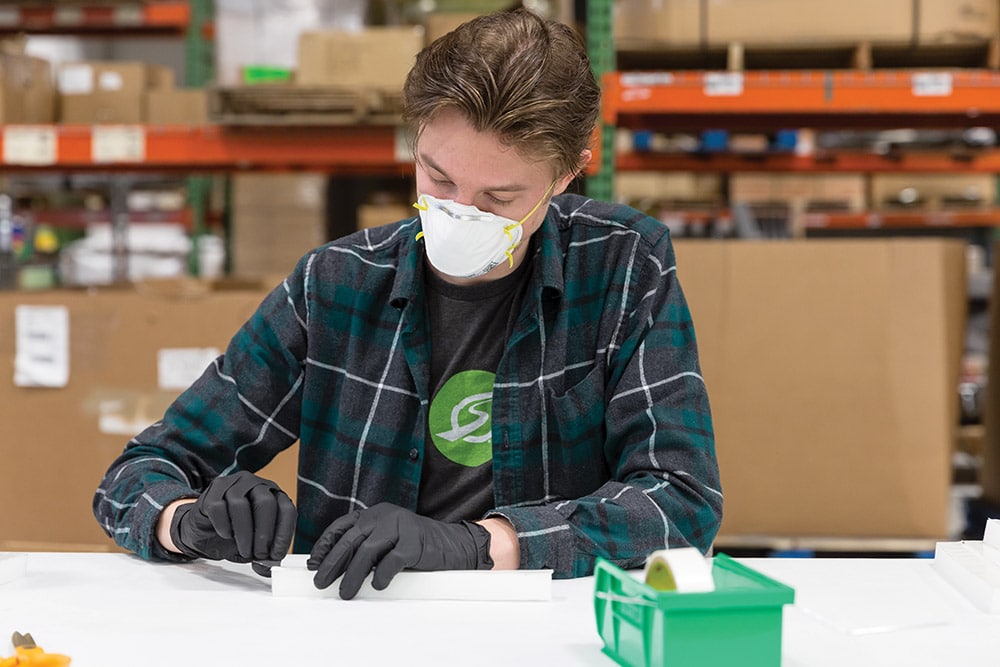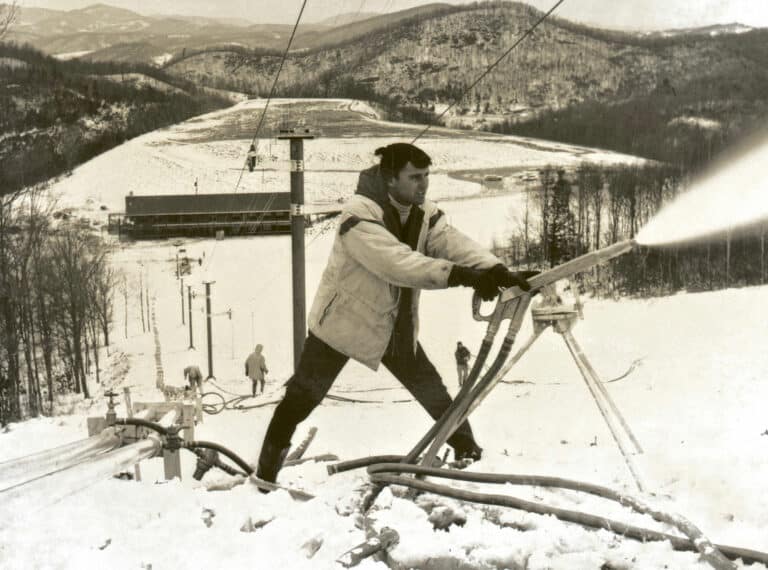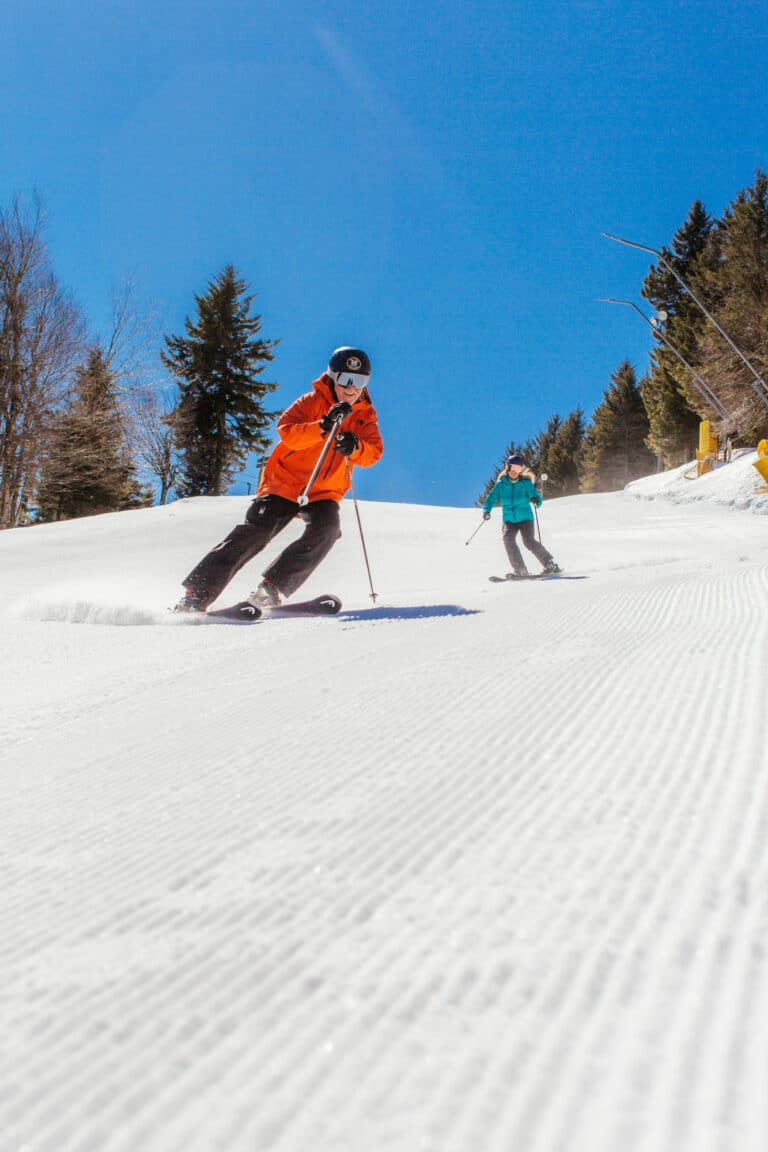Making It Work in the Time of COVID-19
Employees at pop-up camper company Sylvansport are now making personal protective equipment for healthcare workers. Photo Courtesy of Sylvansport
The country’s economic climate is frighteningly uncertain. The COVID-19 pandemic has prompted businesses to shutter their doors indefinitely, forced millions of Americans to file for unemployment, and mandated millions more to stay at home. Locally and nationally, the outdoor industry, like so many others, is taking a hit. About 90 percent of the industry is built on the backbones of small businesses, many of which are grappling with how to keep their employees paid and their businesses alive. Yet in these scary and unprecedented times, some businesses are getting creative and meeting new challenges head on.
Production Pivot
When Kitsbow CEO David Billstrom cut the ribbon at the cycling apparel manufacturer’s new factory in Old Fort, N.C., he could have never anticipated what was ahead. It was December 2019 and the company had just relocated from California to its new forever home in western North Carolina. Billstrom, who is an emergency medical technician (EMT) by training and former venture capitalist, says he knew in early March that change was in the air.
“Our suppliers in Asia weren’t even answering the phone, let alone shipping,” he says. “We knew it was real.”
In a matter of days, the company went from discussing layoffs (which they agreed not to do) to navigating the world of personal protective equipment (PPE) manufacturing. Thanks to the factory’s flexible layout—sewing machines and assembly tables are built on rolling caster wheels—Billstrom and his team have been able to seamlessly pivot from making riding apparel to face masks and shields. On March 28, Kitsbow announced that it had entered into a four-month contract with Dogwood Health Trust to produce 100,000 units a week for western North Carolina’s healthcare workers.
“Being of service during a really hard time, that is an honor,” says Billstrom. “As an EMT, I’ve been ready for a national disaster, I just didn’t think my role would be in an apparel company.”
To meet that 100,000-units-per-week quota, Kitsbow is working with other regional partners like Ooweee Products in Boone and Watershed Drybags and Industry Nine in Asheville. Industry Nine—which manufacturers bike components and wheels at its machine shop, Turnamics—has 100 Computer Numerical Controlled machines at its disposal. Those machines, and Industry Nine owner Clint Spiegel’s 45 years of manufacturing experience, have been instrumental in increasing efficiency for shield production.
“We’re all focusing our efforts and teaming up to be able to produce more together,” says Spiegel. “We definitely started with the cards stacked against us, especially when you’re going from 0 to 60 this fast, but seeing everyone come together has been great.”
Brevard-based SylvanSport, a pop-up adventure camper company, has also shifted to producing face shields, sneeze barriers, and foot-operated door-opening devices. The company’s supply team in Thailand has also helped procure 200,000 N95 masks per week and thousands of Tyvek suits for local and state distribution. SylvanSport Founder Tom Dempsey says he is humbled by the sacrifices of not only healthcare workers but also employees and community members showing up to give back.
“Everyone has had to snap into action mode and put their best foot forward every day,” he says. “All sides of humanity come out on display in difficult times but I’m super grateful to be working with a great group of people who are rising to the occasion. I go home at night and I’m emotional about it. It’s exhausting and gratifying all at the same time.”
During a time when many companies are having to lay off their employees, SylvanSport, Industry Nine, and Kisbow are all hiring. Visit their websites for more information.
Virtual Connection
Professional mountain biker and coach Jeremiah Bishop of Harrisonburg, Va., won’t be participating at many in-person races this season, but he’s still finding ways to stoke the competitive fire digitally. With support from his sponsor Canyon Bicycles, Bishop has been leading weekly group rides and participating in races via Zwift, a virtual training app for running and cycling.
Bishop’s clients live all over the world, including places like Spain and Italy where outdoor cycling is prohibited. He says harnessing the power of Zwift, video chats, and online training software like Training Peaks allows the cycling community to socialize and stay motivated.
“Connection is such an important part of people training and socializing,” he says. “It’s part of what we really miss, and I’m really glad to have at least these tools to rally together.”
Blue Ridge Hiking Company owner, author, and Appalachian Trail record holder Jennifer Pharr Davis is also embracing the web to bring the outdoors indoors. In April, her Asheville-based guiding and retail shop launched an online Armchair Adventure Book Club, which will run through May 28. Every Thursday at noon, readers can tune into a live question-and-answer session with a published author in the outdoor and conservation space.
“I don’t know if it turns the tables for us as far as revenue,” says Davis. “We have all of these books in stock and people can order online, but it’s a good way to keep the community engaged and remind people of the importance of the outdoors.”
Online Ordering
When Ragged Mountain Running Shop in Charlottesville, Va., first closed its doors to the public, owners Mark and Cynthia Lorenzoni continued to serve customers by providing free home drop-offs. For 18 days, the Lorenzonis schlepped boxes of running shoes and gear door to door, leaving boxes on doorsteps to avoid potentially infecting customers.
As social distancing guidelines evolved, so, too, has Ragged Mountain’s response. Today, the store no longer offers home deliveries, but customers can still order online and receive 15-percent discounts plus free shipping.
“We want to be good business neighbors,” says Mark Lorenzoni. “We’ve been overwhelmed with the support. Obviously we’re not as busy as we would normally be this time of year, but it’s enough to hopefully pay the bills.”
Curbside PickUp
New River Bikes owner Andy Forron of Fayetteville, W.Va., has never thought of his bike shop as “just” a bike shop. It’s always been a communal space, somewhere customers can drink a beer and scheme adventures. But these days, it’s quiet in the shop. Forron is still working on bikes and selling gear, but it’s by appointment only. Customers must drop off and pick up their bikes without ever setting foot inside the shop.
“It’s totally different than how we normally operate,” he says. “We are all about hanging out in the shop. It’s not uncommon to have four or five people just hanging out. We actually had to get a bigger couch.”
Forron says there’s no doubt that the appointment-only service and social distancing guidelines have reduced the walk-in sales and repairs from visiting tourists, but he says the shop is staying busy thanks to the continued support of the local community.








